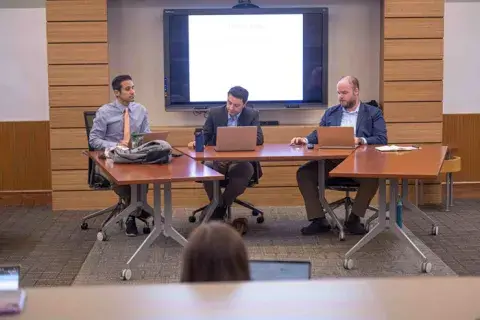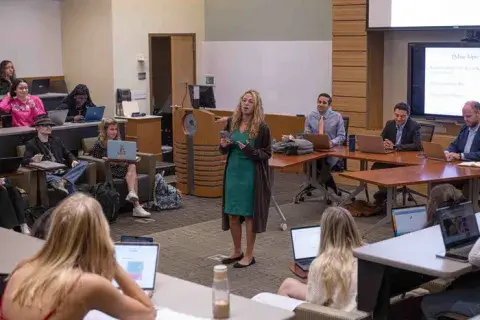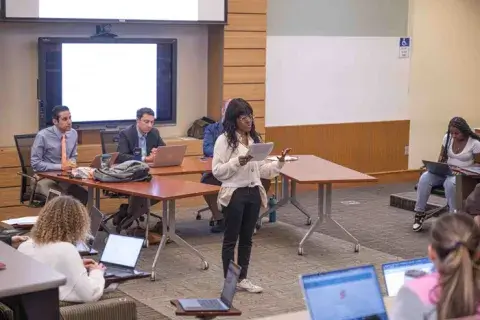Honors Students Examine Two Polarizing Topics: Faith and Politics
Learn how the Faith and Politics class in the Honors Program at Saint Leo University is empowering undergraduate students in many ways.

Learn how the Faith and Politics class in the Honors Program at Saint Leo University is empowering undergraduate students in many ways.

When you hear the words “faith” and “politics,” your mind likely generates a wide range of feelings, emotions, and opinions. These two aspects of our society can certainly be polarizing. That is why a course blending them together is giving students a unique environment to express themselves on the topics in a safe space.
This spring, Saint Leo University offered HON 161: Faith and Politics. The undergraduate Honors Program course, being offered for the third time at University Campus, had two sections with a total of about 110 students. Like other honors classes, the course took a team-teaching approach to the curriculum. This particular course was facilitated by Dr. Timothy Jussaume, an associate professor of philosophy and director of Saint Leo’s Honors Program; Dr. Stephen Okey, an associate professor of theology; and Prof. Frank Orlando, an instructor of political science.
Jussaume explains the goal behind the curriculum.
“This course engages the intersection of theology, politics, and philosophy,” Jussaume says. It explores both the historical and contemporary role of religion in public life, while at the same time asks the more normative question of what role religion should or should not play in politics.”
According to Okey, students in this class look at these concepts from different vantage points.
“They have considered it on both the individual, ‘What does this mean for me’ level and the social, ‘How does this impact the world’ level,” Okey explains. “Students have been challenged to reflect on their own religious and political assumptions and commitments, and then put those in dialogue with key ideas, major figures, and their classmates.”
Orlando believes this course topic being offered as a first-year honors course is perfect for preparing students in many ways.
“We want to develop students’ analytical, writing, and presentation skills, with a special emphasis on being able to make compelling arguments across a variety of different modes,” Orlando says.
Okey points out how faith and politics are often forbidden from discussion in many aspects of our society. However, this class is raising the curtain to provide a stage for these critical conversations.
“All of these students have heard some version of, ‘It's impolite to talk about religion and politics,’” he says. “These are often the topics that are major sources of meaning or concern for people in our world. Rather than avoid what are sometimes difficult or uncomfortable conversations, I want to push students to think through them and be prepared for more intelligent and productive conversations.”
Jussaume offers a similar take.
“It opens a forum for students to ask what it means to be an engaged citizen in an increasingly polarized religious and political environment,” Jussaume says. “Regardless of one’s own beliefs or politics, a thoughtful appreciation of others’ perspectives on these issues is an essential part of living in a community.”
“This class is really essential to unlocking so much of what makes society tick,” Orlando says. “It's important to understand how we got to where we are, and what we can expect in the future as society continues to become more secular.”

Throughout the semester, the three instructors got to focus on their academic specialties. For Jussaume, he discussed how political philosophers think about the relationship between religion and politics, specifically power and authority in religious and political communities. Okey incorporated Christian scripture and later figures of the Christian tradition into his portion of the course. Orlando helped students explore the social science aspects of faith and politics.
According to Orlando, the faculty members effectively worked together in guiding the curriculum.
“Our content areas complement each other,” he says. “We respect each other's expertise and teaching abilities. Our unique teaching styles all kind of work together. It's a blessing to be able to work with people that are your friends, and the students pick up on our vibe of being able to share opinions, debate, and ask questions in a fun and respectful way.”
Okey also enjoyed the collaboration.
“It's a real gift to have people with different expertise working on the same questions,” Okey says. “It also shows the need to consider multiple views and skill sets when trying to solve problems. We each have a lot of respect for one another and are able to demonstrate the kind of respectful engagement that we want all students to participate in.”
“In our interactions with each other, we lead by example in terms of what it means to engage with questions from our own distinct disciplinary backgrounds and life experiences,” Jussaume adds. “Our hope is that our honors students see that engaged citizenship requires us to approach the most important questions from multiple angles in order to see their full complexity.”
Okey is hopeful that the students walked away with new perspectives.
“I hope they are leaving the course with better insights about their own beliefs and how those beliefs affect society as a whole,” he says.
“Faith and politics affect all of us, regardless of our individual beliefs,” Jussaume adds. “When we discuss these topics, we are exploring our deepest values on questions of identity, community, goodness, and happiness. It is our hope that students in the course see how important it is to learn to talk about these questions effectively and to remain open to perspectives that challenge them to think in new ways.”
Orlando believes positively impacting students now can prepare them to make a difference in the long run.
“I really believe that with each student that goes through this course, we're helping to do our part to build a more mature, thoughtful, and healthy society.”
The course primarily consisted of freshmen and sophomores. One student, Samantha Mioduszewski, is a freshman pursuing a bachelor’s in business management. She is a 2022 alumna of Wendell Krinn Technical High School in New Port Richey, FL and already earned an associate degree in digital cinema production from Marchman Technical College. Mioduszewski has nothing but praise for Saint Leo’s Honors Program.
“Dr. Jussaume is so great,” she says. “He is so energetic.”
Being surrounded by other honors students in the Faith and Politics class was empowering, she adds.
“It is so much fun to be in an environment with students who truly have the same level of interest in the class that you do.”
She says getting three unique perspectives from her instructors in the class was also a nice perk.
“I loved how the professors worked together so well. They have a great dynamic. Plus, they seem like they actually care about you and your success.”
The readings from Socrates were among her favorites. For her term paper, she examined Ronald Reagan’s 1983 “Evil Empire” speech delivered to the National Association of Evangelicals at the height of the Cold War.
“It was fun to examine the idea of what scripture means in that context.”

Toward the end of the term, a unique part of the course involved in-class debates. Each student was randomly placed on a team of between five and seven. Each team was given a topic related to faith and politics to either argue in favor of or against.
“I was lucky to have a great group of teammates,” Mioduszewski says. “We were all very prepared on what to say and how to counter with our own arguments.”
Her team had to affirm why religious identity is more important than political identity.
“We were graded on how we spoke, how much we looked at our notes, and how prepared we were with counterarguments.”
For the final project, students had the choice of producing a PowerPoint presentation, podcast, or short documentary. She and Sophia Michelangelo, a fellow student in the class, worked together on a podcast discussing the impact of Americans becoming less religious and its effect on society.
Thanks in large part to what she learned in the course, she believes there is a simple reason conflict exists.
“Everyone wants to be right so badly. When someone questions something, people get very defensive because they don’t want to be wrong.”
She explains what she and her fellow students truly walked away with from this course.
“This class has helped us be forced out of our comfort zones and our hometown mentalities,” she asserts. “The discussions are so important to have, especially for incoming freshmen. I honestly think every student should take this class.”
Another Faith and Politics student, Ryan Joseph, is a sophomore majoring in computer science. A 2021 graduate of Thomas Jefferson High School in Tampa, the 20-year-old native of Haiti has an older brother, Kevin, who also graduated from Saint Leo with a BS in biology in 2019.
Joseph has found his experience in the Honors Program to be quite rewarding.
“It’s been a fun experience,” Joseph says. “I feel like the classes have taught me a lot of life lessons. I have learned a lot about how I think and operate.”
The Faith and Politics class was a great representation of the honors courses in general, he says.
“I appreciated that the class didn’t feel forced or rehearsed where people are agreeing on everything, even the professors.”
He especially found Dr. Okey to be very engaging as one of the professors in the class.
“I could tell he not only cared about the class, but he truly cares about what he is teaching,” Joseph says. “You could tell he wasn’t just reading a script. He was truly speaking from the heart.”
Like Mioduszewski, the most memorable reading assignments for him were those from Socrates. As for the debates, Joseph was a member of The Gaslighters team. The team had to affirm that religion has had a positive impact on the United States. For his final project, he looked at how religion affects people’s opinions about immigration.
According to Joseph, the course gave him a new outlook on many aspects.
“Know that you are not always the smartest person in the room. There is always more for you to learn. Also, when reading texts, always keep in mind the context.”
Finally, Audrey Lehto-Chew is a communication major in the class who is wrapping up her freshman year. A 2022 alumna of Fivay High School in Hudson, FL, the 19-year-old says she learned of the university in middle school through the Advancement Via Individual Determination (AVID) program.
Lehto-Chew says this class and others in the Honors Program offer a highly unique environment.
“This class was a very perception-expanding experience,” she says. “It has been great to have such mature conversations and be heard and respected. We’re all engaging in the same level of intellectual conversations. Also, every time I made a contribution to the discussion, everyone always acknowledged it, and it was never a 1-sided conversation.”
She enjoyed having multiple instructors in the class.
“I loved the way each of their contrasting personalities livened up the material. The way they take their specialties so seriously makes me proud that I have instructors who care so much.”
At one point, she was reading aloud something for the class while at Chili’s where she works.
“A customer came up to me and was so excited to see someone younger reading religious material,” she recalls. “Hearing that made me love doing the homework I was doing.”
For one of her papers, she examined a speech delivered by then-presidential candidate Donald Trump in 2016 at Liberty University in which he referenced 2 Corinthians 3:17.
“We had to read between the lines of the religious material and analyze what the political speaker was saying,” she explains. “This assignment was the first major takeaway on how I found historical literature in contemporary context.”
She admits the debates were challenging but rewarding at the same time.

“Some of us had to take a stance we don’t necessarily agree with, but this has helped us learn how to gain a new perspective.”
Her team was given the debate topic of affirming that religion has been a net positive for American society. She has some wise words on why debates are so important.
“The same eyes I look at the world through are not the same way anyone else will look at things. At the end of the day, we can agree to disagree, as long as we respect each other.”
And what did she ultimately gain through her involvement in the Faith and Politics course?
“It was one of the most intellectually challenging yet relaxed classes I have ever taken,” she says. “It really reinforced how important perspective is. I can honestly say you will walk out of class feeling more valued than when you walked in.”